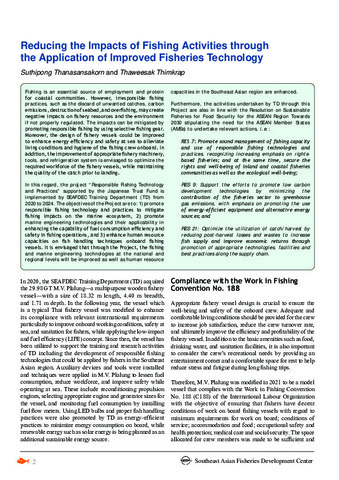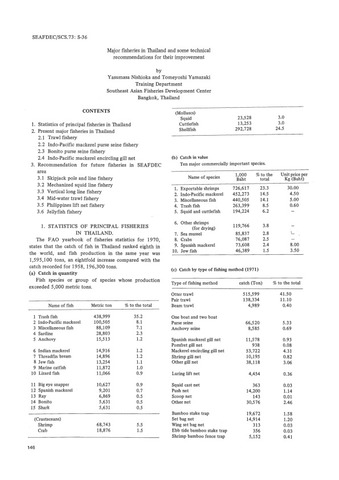| dc.description.abstract | Fishing is an essential source of employment and protein for coastal communities. However, irresponsible fishing practices, such as the discard of unwanted catches, carbon emissions, destruction of seabed, and overfishing, may create negative impacts on fishery resources and the environment if not properly regulated. The impacts can be mitigated by promoting responsible fishing by using selective fishing gear. Moreover, the design of fishery vessels could be improved to enhance energy efficiency and safety at sea to alleviate living conditions and hygiene of the fishing crew onboard. In addition, the improvement of appropriate fishery machinery, tools, and refrigeration system is envisaged to optimize the required workforce of the fishery vessels, while maintaining the quality of the catch prior to landing.
In this regard, the project “Responsible Fishing Technology and Practices” supported by the Japanese Trust Fund is implemented by SEAFDEC Training Department (TD) from 2020 to 2024. The objectives of the Project are to: 1) promote responsible fishing technology and practices to mitigate fishing impacts on the marine ecosystem, 2) promote marine engineering technologies and their applicability in enhancing the capability of fuel consumption efficiency and safety in fishing operations, and 3) enhance human resource capacities on fish handling techniques onboard fishing vessels. It is envisaged that through the Project, the fishing and marine engineering technologies at the national and regional levels will be improved as well as human resource capacities in the Southeast Asian region are enhanced.
Furthermore, the activities undertaken by TD through this Project are also in line with the Resolution on Sustainable Fisheries for Food Security for the ASEAN Region Towards 2030 stipulating the need for the ASEAN Member States (AMSs) to undertake relevant actions, i.e.:
RES 7: Promote sound management of fishing capacity and use of responsible fishing technologies and practices, recognizing increasing emphasis on rightsbased fisheries; and at the same time, secure the rights and well-being of inland and coastal fisheries communities as well as the ecological well-being;
RES 9: Support the efforts to promote low carbon development technologies by minimizing the contribution of the fisheries sector to greenhouse gas emissions, with emphasis on promoting the use of energy-efficient equipment and alternative energy sources; and
RES 21: Optimize the utilization of catch/harvest by reducing post-harvest losses and wastes to increase fish supply and improve economic returns through promotion of appropriate technologies, facilities and best practices along the supply chain. | en |




